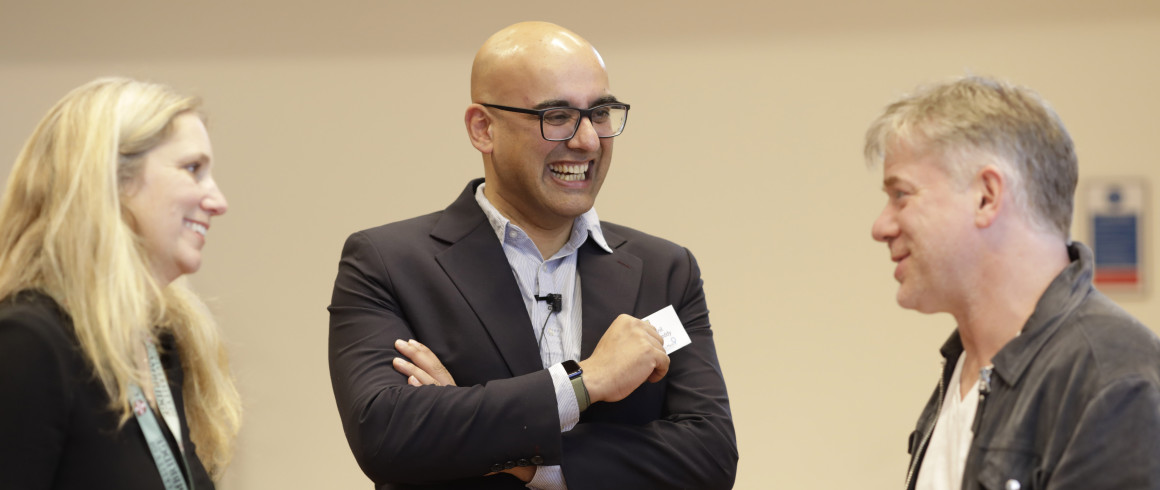November 2022 - Coco Huggins (2020), PhD Student at Pembroke, reflects on the 17th William Pitt Seminar & Geographies of Crisis
Organised by Pembroke College, the 17th William Pitt Seminar brought together a panel of four specialists from various fields of climate science, policy and industry, to debate the question, “Who’s in Charge” of the climate crisis. Professor Emily Shuckburgh, leading climate scientist and Director of Cambridge Zero, chaired the proceedings and was accompanied on the panel by: Professor of Planetary Computing and Director of the Cambridge Centre for Carbon Credits Anil Madhavapeddy; Professor David Cope, former Director of the Parliamentary Office of Science and Technology; and Greg Jackson, CEO of the green energy supplier, Octopus Energy. Professor Shuckburgh invited herself and the other three panellists to give a short address before opening up discussions to the floor.
The question “Who’s in Charge” is one which is arguably even more poignant now than when it was posed at the 17th William Pitt Seminar in October. In the week after our panel of four experts gathered to debate this question vis-à-vis the climate emergency, the UK descended into what can only be described as parliamentary pandemonium. Multiple Cabinet resignations and “shambolic” scenes during a parliamentary vote on fracking, culminated in Prime Minister Liz Truss’s resignation after just 45 days in office. Another Tory leadership contest and yet more firings and re-hirings, left the country truly asking itself “who’s in charge?”. The question was no longer one with an abstract appeal to issues of responsibility, authority and governance, but a very material one.
Although much of this heighted political tension in the UK has (for now at least) subsided, the question “who’s in charge?” still resonates across the world-stage. Whether it be in disputes over the right to abortion and bodily autonomy in the US, the Northern Irish Protocol, or the Russian invasion of Ukraine, “who’s in charge?” brings us to the crux of today’s contemporary conflicts. The question’s ubiquity arguably speaks to the far-reaching ramifications of the climate emergency itself, as well as climate change’s embeddedness in the global crises which characterise the contemporary. This idea of multiple, interconnected global crises was discussed by both Greg Jackson and Prof. Madhavapeddy and became a dominant feature of the seminar’s discussions. Whilst Prof. Madhavapeddy sought to highlight the climate crisis as a global, tripartite emergency of rising carbon emissions, desertification and biodiversity loss, Octopus CEO Greg Jackson positioned climate change in the context of the UK’s national cost-of-living and security crises. This interdependence presents us with both a challenge and an opportunity when trying to address carbon emissions and the broader climate emergency: The ‘right’ solutions to climate change will mitigate a whole host of other issues too, but the ‘wrong’ ones risk escalating other global crises. Switching to a reliance on hydroelectric power or biofuels could, for instance, mitigate the carbon emissions crisis but dramatically escalate biodiversity loss. Similarly, switching our dependence on electricity generation to solar power could still leave us vulnerable to price fluctuations and political instability if that electricity is generated in and imported from, abroad.
Nonetheless, cutting fossil fuel consumption is undoubtedly an essential part of any comprehensive plan to address climate change and our wider crises. As Greg Jackson emphasised, “the reason we’re addicted to oil and gas is because it’s a cheap and convenient form of energy” but when “it ceases to be cheap and convenient” there is no economic (let alone environmental) logic in allowing fossil fuels to persist. The UK has exhausted much of its easily and more importantly, cheaply accessible national reserves and yet in 2019, fossil fuels still accounted for >75% of primary energy consumption. This no longer makes financial sense when, as Greg Jackson highlighted, it now costs 9 times more to generate electricity from natural gas than it does from renewable energy. Soaring oil and gas prices in the wake of Putin’s invasion of Ukraine highlight how Europe’s dependence on imported fossil fuels threatens the continent’s financial and political stability. Our “addiction” to fossil fuels has, for decades, influenced foreign policy, contributing to geopolitical insecurity in the Middle East and beyond. When we ask ourselves “who’s in charge?” the answer, as it has been for decades, is “the incumbent interests of […] the fossil fuel industry” (Greg Jackson). Our energy infrastructure, our transport networks, our trade and distribution of goods and services, have all been designed for a world of fossil fuels and their companies’ lobbyists are firmly embedded within in our political elites. Transitioning to renewables has the potential to tackle these issues head on. By decentralising our energy production and investing in renewable sources of energy like solar, wind and geothermal, the UK has the potential to ‘democratise’ energy production, enabling households or local communities to generate their own power. Our current dependence on oil and gas is not just an issue of carbon emissions, but one of economic and national security. Although less than 4% of the UK’s total gas supply came from Russia in 2021, our use of pipelines in countries which are highly dependent on Russian imports, still makes us vulnerable to the same price fluctuations. Transitioning to UK-based renewables would eliminate the potential for such fluctuations, stabilising energy prices in both the long and the shorter term. As per Greg Jackson, “the economics is clear”: British-sourced renewables make financial, as well as environmental and security-sense.
Effective climate solutions like renewables cannot be instigated however, without intervention from multiple stakeholders. The seminar’s discussions provide us with an exemplary microcosm of any effective solution to climate change. In its participants we can identify five basic “cogs” of climate action: National and international policy in the form of Prof. Cope; rigorous scientific research—Prof. Shuckburgh; industry and technological innovations— Octopus CEO Greg Jackson; market forces— Prof. Madhavapeddy (as Director of the Cambridge Centre for Carbon Credits); and finally, the audience as individuals and a form of collective action. We will be reliant on these five cogs working together as one ‘machine’ if we are ever going to get to grips with climate change. Although a number of solutions were brought to the table, from a direct and accountable carbon credit system to offset emissions, to nuclear energy, renewables and dramatic cuts in energy consumption, all effective mechanisms will need to incorporate these five core elements. It is this message of cooperation and interdependence which is, perhaps, the most important thing we can take home from this year’s William Pitt Seminar.
Coco Huggins is a Second Year PhD candidate in the Department of Geography and was Graduate Parlour Committee (GPC) President at Pembroke from 2020 to 2021. Her doctoral research seeks to deconstruct the ideological, moral and economic motivations behind UK reforms to the Welfare State after the 2008 Financial Crisis. She is a practicing Christian and has a keen interest in the role of faith institutions in mitigating the climate and migrant crises.


